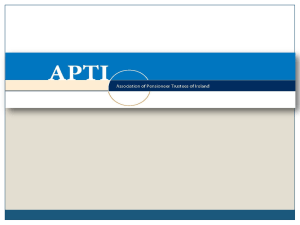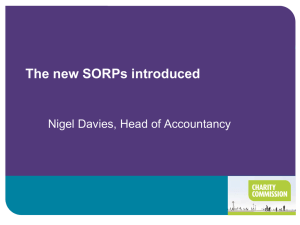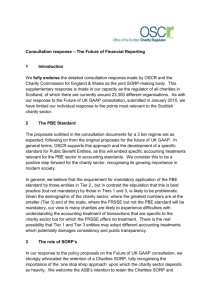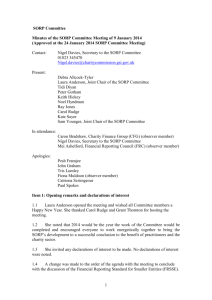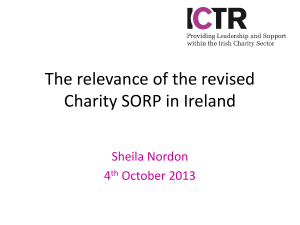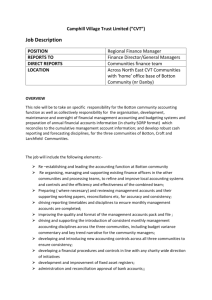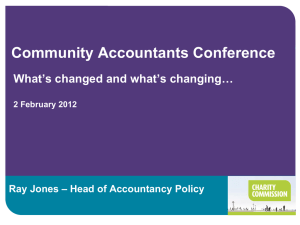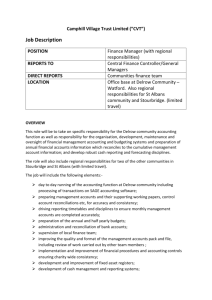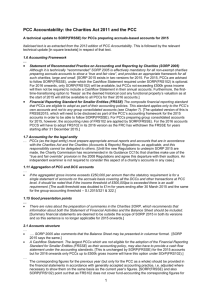Approved minutes 12 February 2014 meeting
advertisement
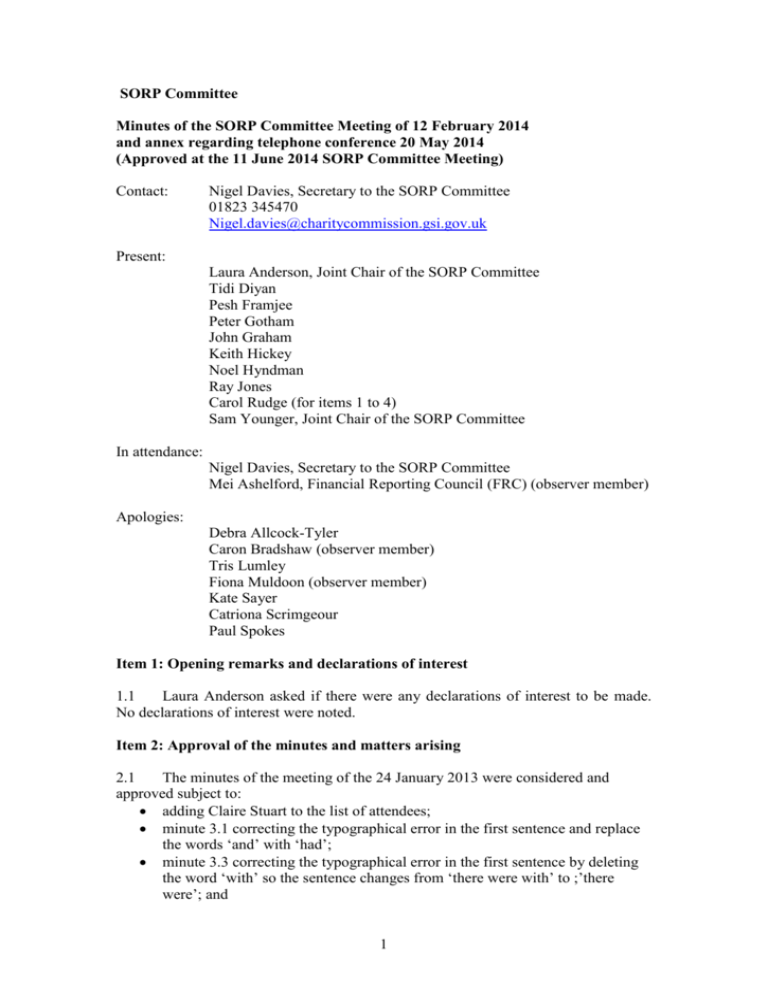
SORP Committee Minutes of the SORP Committee Meeting of 12 February 2014 and annex regarding telephone conference 20 May 2014 (Approved at the 11 June 2014 SORP Committee Meeting) Contact: Nigel Davies, Secretary to the SORP Committee 01823 345470 Nigel.davies@charitycommission.gsi.gov.uk Present: Laura Anderson, Joint Chair of the SORP Committee Tidi Diyan Pesh Framjee Peter Gotham John Graham Keith Hickey Noel Hyndman Ray Jones Carol Rudge (for items 1 to 4) Sam Younger, Joint Chair of the SORP Committee In attendance: Nigel Davies, Secretary to the SORP Committee Mei Ashelford, Financial Reporting Council (FRC) (observer member) Apologies: Debra Allcock-Tyler Caron Bradshaw (observer member) Tris Lumley Fiona Muldoon (observer member) Kate Sayer Catriona Scrimgeour Paul Spokes Item 1: Opening remarks and declarations of interest 1.1 Laura Anderson asked if there were any declarations of interest to be made. No declarations of interest were noted. Item 2: Approval of the minutes and matters arising 2.1 The minutes of the meeting of the 24 January 2013 were considered and approved subject to: adding Claire Stuart to the list of attendees; minute 3.1 correcting the typographical error in the first sentence and replace the words ‘and’ with ‘had’; minute 3.3 correcting the typographical error in the first sentence by deleting the word ‘with’ so the sentence changes from ‘there were with’ to ;’there were’; and 1 minute 3.25 adding the missing bullet point: ‘Module 7 consider information sheet 1 and incorporate any helpful additional advice about recognising commitments’. Item 3: Matters arising: controversial topics reconsidered 3.1 Ray Jones introduced this item. He identified three issues that might attract critical comment in the way that the SORP currently proposed to handle them. The issues were: the handling of the Financial Reporting Standard for Smaller Entities (FRSSE), the idea of a single column Statement of Financial Activities (SoFA) and the guidance provided on accounting for legacies. 3.2 He noted that although the rationale for separating out the FRSSE requirements and producing a FRSSE SORP was well thought through, some may question why we have gone from a 120 page SORP 2005 to two SORPs at about 180 pages each. Due to likely changes in UK-Irish Generally Accepted Accounting Practice (GAAP), FRSSE users also faced moving from SORP 2005, to the FRSSE SORP and possibly within 2 years to a new FRSSE SORP. It was unfortunate that old GAAP had not been retained because then SORP 2005 could have been used by FRSSE users until a new FRSSE, compliant with the new EU Accounting Directive, had been developed. 3.3 Committee members discussed why two SORPs had been developed and concluded that this simply reflected the complexity of GAAP with two very different standards in place from 2015, the FRSSE based on old GAAP and FRS 102 based on new GAAP. Since no one charity would use both standards when preparing the accounts, the user of the SORP only has to refer to one and not both SORPs. By dropping the combined approach of the Exposure draft SORP it made it easier for the user who then only had to refer to the standard they were actually using (the FRSSE or FRS 102) and its SORP. Also a separate FRSSE SORP avoids FRS 102 users being disrupted when the current FRSSE is replaced. 3.4 Ray Jones asked the Committee to again consider the merits of a single column SoFA. He noted that this format would align the Charities SORP with the other Public-benefit Entity (PBE) SORPs. He noted that there was support from some umbrella bodies and accountancy firms for having this option available and the reluctance to permit this option might be viewed by some as showing excessive conservatism on the part of the SORP Committee. He gave the example of some endowed charities that considered a single column better shows the application of a total return approach to the investment of endowment where to an extent the distinction between endowment and income funds is blurred and the use of transfer entries or negative income entries to show the application of unapplied total return was arguably confusing to the reader of the accounts. 3.5 Committee members noted the strong support for the current SoFA demonstrated in the SORP research exercise and subsequently in the consultation on the Exposure Draft SORP. The distinction between unrestricted and restricted funds was considered a fundamental part of charity accounting and is of significant interest to donors and funders. However, where classes of fund were immaterial then Committee members noted some already blended them with other classes of fund. 2 3.6 The Committee concluded that the SORP should allow the option of a single column SoFA provided the column heading was very clear and additional information was given in the notes to the accounts. However this option should only be available where a single class of funds was material in terms of either income or expenditure or gains and losses in the reporting period and all other classes of funds are immaterial. A linked presentation of the carry forward balances for each class of fund must also be given at the foot of the SoFA. 3.7 Ray Jones reflected on the discussion to date on the recognition of income from legacies. He noted that although there appeared to be a lack of consensus on the way forward amongst respondents with a diversity of accounting treatments and views, many respondents had asked for greater clarity and the revised text still fell short in meeting this need. 3.8 Committee members noted that the diversity of views in the sector was also reflected amongst the Committee. There had been no specific consultation question proposing a particular standardised approach to the recognition of legacy income. Therefore although the outcome of the consultation might support providing more advice it was not a mandate for specifying a standardised approach that might require many charities with significant legacies to change their accounting policies. 3.9 The Committee noted that in the absence of a consensus amongst lawyers as to when entitlement exists in law, any guidance would have to be for accounting purposes only. Also the diversity of existing treatments should not be dismissed as wrong as all were consistent with accounting standards and the legal position. However the Committee noted that much of the diversity was to do with the available information, and issues of certainty of receipt and reliability of measurement. The Committee concluded that there was therefore scope to offer more guidance on entitlement, certainty and measurement without imposing a particular solution. Each charity would have to justify its accounting policy and apply it consistently. 3.10 The Committee noted that those charities in receipt of many legacies and with a depth of experience of legacies in terms of the risk of challenge, likelihood of receipt and accumulated knowledge on the settlement of legacies subject to a life interest, pecuniary and residuary legacies were better placed to apply estimation techniques earlier in the process than those charities with little experience or few legacies. 3.11 Some variation in the timing of recognition was both understandable and very appropriate to the circumstances of individual charities. Probate was a point in the process that many may use but was not of itself the sole event that must trigger recognition. There are other considerations such as the timing of receipt, the nature of the legacy and information from the executors. Necessarily judgment needs to be applied based on the circumstances of the charity and the information available at the time of preparing the accounts about the nature of any assets receivable as at the balance sheet date. 3 3.12 The Committee concluded that: producing a separate SORP for FRSSE users and a separate SORP for FRS 102 users was the right decision; that a single column SoFA be permitted as an option where only one class of funds is material and all other classes of funds are immaterial based on total income and total expenditure in the reporting period; and the guidance on legacies be further amended to reflect the previous discussions on events that lead to recognition and to more clearly structure recognition around the criteria of entitlement, probability and measurability. Item 4: FRS 102 SORP 4.1 Nigel Davies introduced this item and noted that he had updated the FRS 102 SORP for the changes agreed following the Committee’s review of the consultation responses at its January meetings. The revised text was flagged throughout with tagged comments identifying the reason why each change was being made. He took the Committee through the significant changes made in each module. 4.2 The Committee agreed all the changes made to the FRS 102 modules and recommended that the following additional changes be made: Add text to the Introduction noting that the SORP expressly disallows some options; Module 1 retain the requirement for larger charities to identify their strategies for mitigating risk; Move custodian trusteeship content from module 1 to module 19; Module 2 add a reference to the Trusts (Capital and income) Act 2013; Module 4 change the SoFA heading ‘other activities’ to ‘other trading activities’ and change any references elsewhere. Module 4 amend to permit the option of reporting using a single column SoFA where only one class of funds is material subject to additional disclosure in the notes to the accounts. Module 5 delete paragraph 5.12 as it is unnecessary. Module 5 amend the advice on recognising income from legacies in accordance with the preceding discussion. Module 6 consider how best to treat income from the sale of goods when donated goods have already been recognised as stock. Module 15 when referring to Companies Bill (Republic of Ireland) insert a reference to the date the SORP is issued. Module 16 substitute charity URL for the reference to the charity’s home page. Module 24 note that the exclusion of a subsidiary due to severe long-term restrictions is to do with the absence of benefit and this means a complete dissimilarity of charitable purposes and beneficiary class. Module 24 paragraph 24.25 delete the second sentence as the meaning is unclear. Module 24 note that for any charity combination treated as an acquisition where negative goodwill arises, that negative goodwill is wholly written off in the year of acquisition as a gain. Add a definition of ‘impact reporting’ to the glossary. 4 The Secretariat to circulate by e-mail the revised FRS 102 text with only the additional changes highlighted for a final review by the Committee. Item 5: FRSSE SORP 5.1 Ray Jones introduced this item and referred the Committee to the draft FRSSE SORP which had been revised to reflect throughout the text the principles agreed at the last meeting. In particular, it identified the difference between current and accepted practice with all charities following the FRSSE SORP required to reflect current practice for charity specific accounting treatments but otherwise are able to retain the accepted practice of their existing accounting policies for non-PBE items. He noted that changes reflected in the charity specific text in the FRS 102 SORP had yet to be incorporated, where appropriate, into the FRSSE SORP. 5.2 He noted that where the FRSSE is silent on a non-charity specific issue then the treatment recommended is based on FRS 102 and is a ‘should’ not a ‘must’ because FRSSE users are only obliged to have regard to FRS 102 and current practice but are not required by FRSSE 2015 to apply it. 5.3 He noted that the FRSSE recognition criteria for income included a criterion based on ‘adjustment for uncertainty’ which was not the same as ‘virtually certain’ within SORP 2005. The FRSSE criterion was closer to that of FRS 102 ‘probable’ criterion. He also noted that as FRSSE was old GAAP, the SoFA treatment of gains and losses on investments was different to that required by FRS 102. 5.4 The Committee agreed that: The FRSSE SORP fairly reflects the agreed approach. The FRSSE SORP is agreed subject to it now incorporating the relevant charity specific changes. Item 6: Update from the FRC 6.1 Mei Ashelford advised that there was still some uncertainty about the timing of the implementation of the EU Accounting Directive into UK law and consequently continuing uncertainty as to when the planned consultation on changes to the FRSSE regime for small companies would take place. 6.2 She noted that the FEHE SORP had cleared the Committee on Accounting for Public Benefit Entities (CAPE) but an outcome of that discussion was a desire for the FRC to take forward the planned research on accounting for income from government grants. Item 7 Any other business 7.1 There being no other business the meeting closed. 5 Annex regarding telephone conference 20 May 2014 at 4pm Present: Laura Anderson, Joint Chair of the SORP Committee Pesh Framjee John Graham Ray Jones Sam Younger, Joint Chair of the SORP Committee In attendance: Caron Bradshaw (observer member) Nigel Davies, Secretary to the SORP Committee A.1. Sam Younger opened the telephone conference and thanked those able to join the discussion. The discussion was being held following feedback from the Financial Reporting Council (FRC) on the deliberations of the FRC’s Codes and Standards Committee. Although the two SORPs had been approved by the Codes and Standards Committee for consideration by the FRC Board on 22 May, the FRC strongly encouraged the SORP-making body to consider again the disclosure of senior staff pay prior to the discussion at the FRC Board. A.2. The FRC had noted the action already taken to extend banded disclosure of salaries over £60,000 to all charities and for larger charities to disclose their pay policy for senior staff. However since the SORP had been submitted for FRC approval, the NCVO had published a report making new recommendations as to good practice. Although not all Committee members could make the conference, several had e-mailed observations and comments and these were noted. A.3. Committee members noted that the text of the SORPs went beyond the requirements of accounting standards and the requirements of other Public Benefit Entity SORPs. Therefore there were no technical grounds for the FRC not to approve the SORPs. This issue had been considered and debated several times and Committee members were keen that the users of the trustees’ annual report and accounts retained a focus on what the charity was set up to do and what it had achieved. The banded disclosure and the context of the pay policy provided far more useful information for decision-making than the exact salary paid to an individual. If institutional funders had particular needs they could always request such information. A.4. It was also important that the integrity of the consultation process was not compromised. The responses on this question had been carefully reviewed and debated. A late change based on a report of one sector umbrella body in one charity jurisdiction of itself did not make a compelling case to over-turn the outcome of the consultation process and impose a requirement at such a late stage in the development process. To do so risked undermining sector confidence in the SORP and SORPmaking process. A.5. Clearly the issue would merit considering again at a future SORP consultation. Also the annual review process required by the FRC Code of Practice provides an opportunity to keep an eye on developments in sector good practice. Flexibility was needed for charities to tell their story and many charities may wish to go beyond a baseline of reporting required by the SORP and provide more information on senior 6 staff pay. With this in mind, the proposed additional text in the SORP-making body’s submission to the FRC Board, sign-posting what trustees should consider regarding remuneration disclosures, offered an opportunity to enhance the text of the SORPs without creating a rigid framework. A.6. Committee members agreed that: They were in support of the change proposed by the SORP-making body if it was required by the FRC Board. The change simply sign-posts suggestions of what trustees should consider regarding disclosures. That the new text be added to both the FRSSE SORP and FRS 102 SORP. 7
